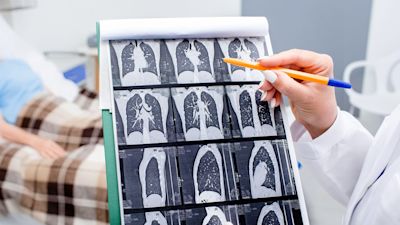More cancer patients than ever in England are being diagnosed at early stage

Between September 2023 and August 2024, nearly 60% of common cancers were identified at these early stages, NHS England's clinical director for cancer, ITV News' Correspondent Rachel Younger reports
The number of patients being diagnosed with early-stage cancer has reached its highest ever level, NHS analysis has revealed.
Nearly three in five patients are being diagnosed when their cancer is at stage one or two, when it is easiest to treat, according to the data. Research focused on the most common cancers, such as breast, prostate and lung.
The NHS said the news follows a major drive over the last two years to encourage millions of people to come forward for potentially life-saving checks. This includes those who may be at a higher risk because of hereditary or lifestyle factors.
New data shows almost 60% of common cancers diagnosed between September 2023 and August 2024 were identified at an early stage.
This marked an extra 7,000 patients having their cancer caught in its early stages, up 2.7% from pre-pandemic levels.
New analysis also shows more people than ever were tested for cancer over the last year - with more than three million seen for urgent cancer checks between November 2023 and October 2024, up by more than 700,000 in the same period five years ago.
Dame Cally Palmer, national cancer director for NHS England, said: “There is still much more to do to save more lives and we will not let up in our efforts to catch more cancers earlier, where treatment is more likely to be successful.
“NHS teams across the country are continuing to take tests and checks closer to people who need them, and with new treatments being made available all the time, we will continue to do all we can to get people seen and treated for cancer as early as possible.”
Campaigners have responded by urging the government to tackle lengthy waiting times for their treatment to begin once a diagnosis takes place.
Claire Rowney, the chief executive of Breast Cancer Now, said: "It’s deeply worrying that so many people continue to endure lengthy, anxious waits to have possible breast cancer symptoms checked out, receive a diagnosis and start the vital treatment that gives them the best chance of survival.
"Urgent action" is also needed make sure more women attend breast screening appointments, Ms Rowney added.
The Targeted Lung Health Check (TLHC) and Liver Health Programmes are among the initiatives rolled out by the NHS to help catch more cancers earlier.
Subscribe free to our weekly newsletter for exclusive and original coverage from ITV News. Direct to your inbox every Friday morning.
They see high-tech mobile scanning trucks and vans go into communities to offer in-depth checks to people at shopping centres, sports stadiums, food banks and supermarket car parks.
Data shows more than 5,000 people have been diagnosed with lung cancer earlier via the TLHC programme since it was launched in 2019.
Paul Nelson, 72, from Birkenhead, had no symptoms at all when he went for a TLHC check but a scan found lung cancer.
He said: “I’ve never had any problems with my chest but I was given the check and then offered the scan, so I thought, why not. I am so glad I went.
“This has now been caught early enough for treatment – if things had been left for a few more months it could have been very different."
Want a quick and expert briefing on the biggest news stories? Listen to our latest podcasts to find out What You Need To Know